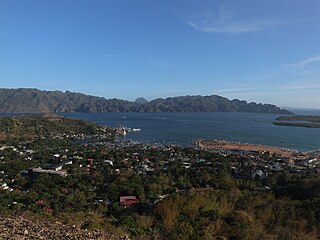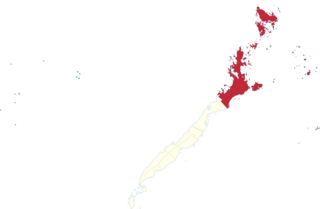
Palawan, officially the Province of Palawan, is an archipelagic province of the Philippines that is located in the region of Mimaropa. It is the largest province in the country in terms of total area of 14,649.73 km2 (5,656.29 sq mi). The capital and largest city is Puerto Princesa wherein it is geographically grouped but administered independently from the province. Palawan is known as the Philippines' Last Frontier and as the Philippines' Best Island.

Busuanga, officially the Municipality of Busuanga, is a 3rd class municipality in the province of Palawan, Philippines. According to the 2020 census, it has a population of 25,617 people.

Coron, officially the Municipality of Coron, is a 1st class municipality in the province of Palawan, Philippines. According to the 2020 census, it has a population of 65,855 people.

Culion, officially the Municipality of Culion, is a 3rd class municipality in the province of Palawan, Philippines. According to the 2020 census, it has a population of 23,213 people.

Cagayancillo, officially the Municipality of Cagayancillo, is a 6th class municipality in the province of Palawan, Philippines. According to the 2020 census, it has a population of 6,884 people.

Cuyo, officially the Municipality of Cuyo, is a 4th class municipality in the province of Palawan, Philippines. According to the 2020 census, it has a population of 23,489 people.

Magsaysay, officially the Municipality of Magsaysay, is a 5th class municipality in the province of Palawan, Philippines. According to the 2020 census, it has a population of 12,603 people.

Taytay, officially the Municipality of Taytay, is a 1st class municipality in the province of Palawan, Philippines. According to the 2020 census, it has a population of 83,357 people.

The Calamian Islands or the Calamianes is a group of islands in the province of Palawan, Philippines. It includes:
Palawan Broadcasting Corporation (PBC) is a Philippine media network. Its corporate office is located in Puerto Princesa.

The Calamian deer, also known as Calamian hog deer, is an endangered species of deer found only in the Calamian Islands of Palawan province in the Philippines. It is one of three species of deer native to the Philippines, the other being the Philippine sambar and the Visayan spotted deer.

The Philippine long-tailed macaque is a subspecies of the crab-eating macaque, known in various Philippine languages as matching/matsing or the more general term unggoy ("monkey"). It is endemic to the Philippine forests and woodlands, but especially in the mangrove forests of western central Philippines— particularly in Palawan, the Visayas, and Mindanao. The names M. f. philippinensis and M. f. philippinenesis have also been used, but arise from orthographical error.
Calamian Tagbanwa is spoken in the Calamian Islands just north of Palawan Island, Philippines. It is not mutually intelligible with the other languages of the Tagbanwa people. Ethnologue reports that it is spoken in Busuanga, Coron, Culion, and Linapacan municipalities.
The Culion leper colony is a former leprosarium located on Culion, an island in the Palawan province of the Philippines. It was established by the U.S. government in order to rid leprosy from the Philippine Islands through the only method known at the time: isolating all existing cases and gradually phasing out the disease from the population. In addition to segregating the disease from the rest of the population, the island was later established in order to offer a better opportunity for people afflicted with leprosy to receive adequate care and modern treatments.

The archaeology of the Philippines is the study of past societies in the territory of the modern Republic of the Philippines, an island country in Southeast Asia, through material culture.

Culion is a 2019 historical drama film directed by Alvin Yapan, starring Iza Calzado, Jasmine Curtis-Smith, and Meryll Soriano. Set in the 1940s, it tells the story of three women seeking a cure of leprosy. The name derives from the eponymous island in Palawan once known as a major leper colony.

Sunlight Express Airways, operating as Sunlight Air, is a boutique airline in the Philippines based in Clark, Pampanga. It operates flights from its operating base in Clark International Airport to Busuanga, Puerto Princesa, Caticlan, Panglao, Siargao, and Cebu using its fleet of three ATR 72-500s.

Palawan's 1st congressional district is one of the three congressional districts of the Philippines in the province of Palawan. It has been represented in the House of Representatives since 1987. The district encompasses the northern portion of Palawan Island including the Calamianes, Cuyo and Kalayaan island chains. It consists of the municipalities of Agutaya, Araceli, Busuanga, Cagayancillo, Coron, Culion, Cuyo, Dumaran, El Nido, Kalayaan, Linapacan, Magsaysay, Roxas, San Vicente and Taytay. The district is currently unrepresented in the 19th Congress following the death of Edgardo "Egay" Salvame of the People's Reform Party (PRP) on March 13, 2024.

Fort Cuyo is a citadel built in 1680 during the Spanish-era in the Philippines. It was constructed to protect the locals from Muslim invaders and other threats.


















